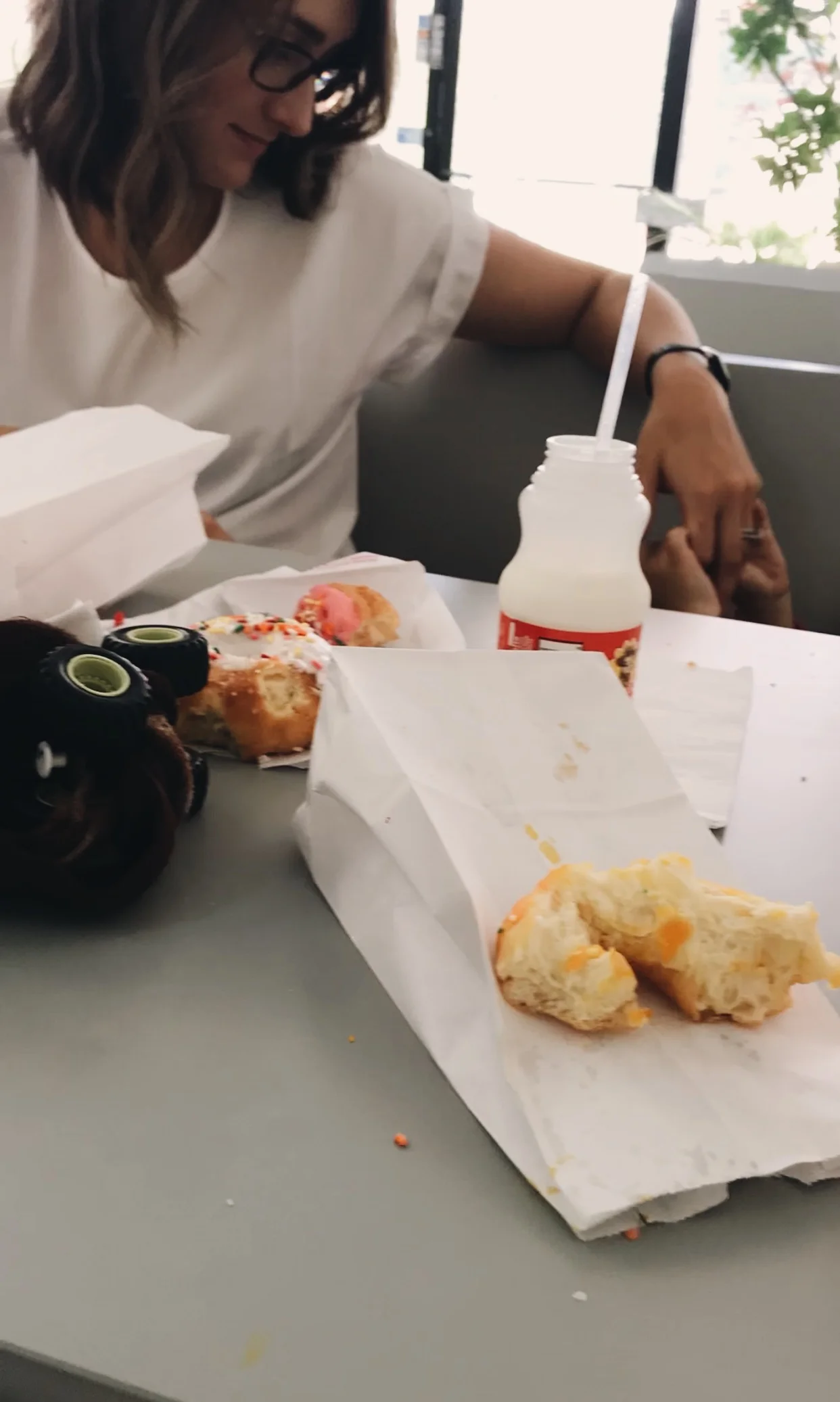Donuts
She can feel the morning wrapping around her like a second skin, or a cloak she throws over her shoulders when she doesn’t want to. Everything has felt so off lately. She feels cut off from everyone around her, as if when she speaks her words bounce off invisible glass plates and land, thunk, at her own feet. As if she is pounding against her own bones, but all anyone around her can see is a plastered-on, beat up smile. She decides that they need to get out. When she asks her son where they should go, he insists on donuts.
The too-sweet smell of pastry hits them as they open the door. Her son runs to the counter, bouncing from foot to foot, impatient for it to be his turn to tell the woman at the register which donuts he wants, impatient to taste the sweet hit of frosting on his tongue. She is surprised by the line and stands behind a woman in a green suit whose hair is so shiny she can almost see her reflection in it. She is impatient too: impatient with the slowness of her own body, with the way her words seem to twist themselves on her tongue when she tries to speak, with the thousand what-ifs bouncing around her mind every day, with the way those same thoughts spun and spun before she can really even grasp them.
At night, she has been dreaming of infernos ignited by her mouth and muscles that spasm and shake the entirety of the bed and a lifespan that shortens and shortens in front of her until she holds it up as a string in front of her face. In the morning she wakes up exhausted, panting and out of breath before the day begins. So hard for her to breathe! She feels like she can’t make it through one more day of this. She had told her husband that a few nights ago.
“What’s that supposed to mean?” he had asked, offended that she must have meant him, must have meant this life they had built. It wasn’t exactly what she had been trying to say, but she couldn’t make him understand.
“I feel like I’m living underwater,” she’d said, “like the oxygen in my body is seeping and seeping out.”
He had shaken his head, muttered, “Whatever,” and turned on a baseball game in the other room so that he could ignore her.
He did not understand that she felt like her body was evicting her, or punishing her, or simply betraying her. He did not understand that sometimes she did not recognize her hands, the tint of her fingers, the ropey muscles that ran up and down her arms. She couldn’t explain it, so, after that, she had decided to stop talking about it.
The woman at the counter asks her what they would like to order. “Blue sprinkle donut, red sprinkle donut, apple juice,” her son calls out, and then as an afterthought adds, “Please.”
The woman grabs his donuts and stuffs them into a white paper bag with a frothy, dancing donut across the front. The woman looks to her expectantly, but she finds that her mouth is empty. She can’t remember what she wants or even what her favorite donut is or if she even likes donuts. (So much sugar!) The woman stares, waves her hands toward the wall of pastry behind her. “For you ma’am?” she asks again.
She can feel the man behind her shift imperceptibly, impatiently. She is holding him up, holding everyone up, but she can’t find the right words to say. Finally, she manages to tell the woman, “I’ll have the same,” and everyone in the line behind her exhales in silent sighs that she can feel against her back.
Thank goodness, they are thinking.
Took long enough, they are thinking.
Thought she might never order, they are thinking.
The woman hands her a paper bag with the donuts and a small apple juice carton that fits in the palm of her hand. She hands the woman a ten-dollar bill and shakes her head for no change. The woman smiles and looks behind her to the next customer, tongs clicking. She realizes that getting out was not a good idea. Being out means too many people and too many decisions and her words drying up and the swirling eddies of her brain that won’t stop making it all so overwhelming.
Her son has found a seat at a booth that is sticky with old sugar. Her feet make sucking noises against the floor. He eats the tops off the donuts, sucking off the icing and the sprinkles and leaving the dough behind like an afterthought. She takes her donuts out, doppelgangers to her son’s. “You got the same as me!” he tells her, delighted. She smiles because at least there is one person she can still please. She eats them the same way he does: biting off the thick layer of icing, crunching on the sprinkles. It’s so sugary it makes her teeth hurt and she sucks in the hollows of her cheeks. This makes her son laugh, and she thinks that if she can just hold onto that sound, she might be able to make it into the afternoon.





